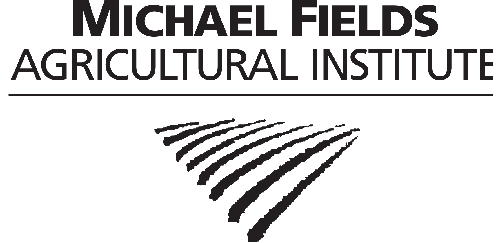Proposed Bill Would Support Managed Grazing Across Wisconsin
By Chuck Anders • Associate Policy Director, Michael Fields Agricultural Institute
In Wisconsin, there is an exciting bill going through the state legislature that would create a new program called the “Transition to Grass Pilot Program”
If signed into law, the program would provide up to $40,000 grants to farmers for technical assistance and implementation support to help farmers to establish new grazing systems or to implement new management that improves conservation and financial performance of existing practices (for example, moving from continuous grazing to rotational grazing).
The grants can be used by farmers for:
1. Establishing perennial forages
2. Establishing harvestable continuous cover in marginal areas for supplemental feed
3. Incentive payments during the first 3 years of their new grazing system
4. Assisting with paying for infrastructure including fencing, water, etc.
5. Paying for technical assistance from a certified grazing specialist
The bill also provides farmers and people in agribusiness with:
1. Assistance navigating and analyzing the economics of grazing
2. Research, market development initiatives, and other market opportunities.
3. Best practices for meeting consumer demand for grass-fed livestock products
4. Assistance in fostering innovation
The bill also ensures that the Department of Agriculture, Trade and Consumer Protection (DATCP) will support Wisconsin’s grassfed supply chain including regional processors, aggregators, distributors, and markets, and provide funding for a grazing specialist on staff at DATCP.
The bill has strong bipartisan support in the Assembly and Senate, and it was passed unanimously out of the Assembly Agriculture Committee in December 2023. The state Senate Agriculture Committee had the bill on the agenda for a hearing on January 30, 2024, and several farmers traveled from all over the state to testify in favor of the bill and to share their passion for grazing. With such unified support across the political spectrum and with no organizations or members of the public registered against the bill, we are hopeful that the state will create this much needed program to support farmers as they transition to managed grazing.
At the federal level, Michael Fields is advocating for the funding and reauthorization for the Grazing Lands Conservation Initiative (GLCI) in both the annual appropriations process and in the Farm Bill. If that doesn’t mean much to you, check out our podcast episode explaining how federal agriculture policy works. GLCI provides cooperative agreements to support grazing technical assistance; farmer-to-farmer learning; and conferences, webinars, and other forms of grazing education.
If you’re reading from Wisconsin and you’d like to get involved in grazing advocacy, sign up for action alerts so we can call on your support in the future.


